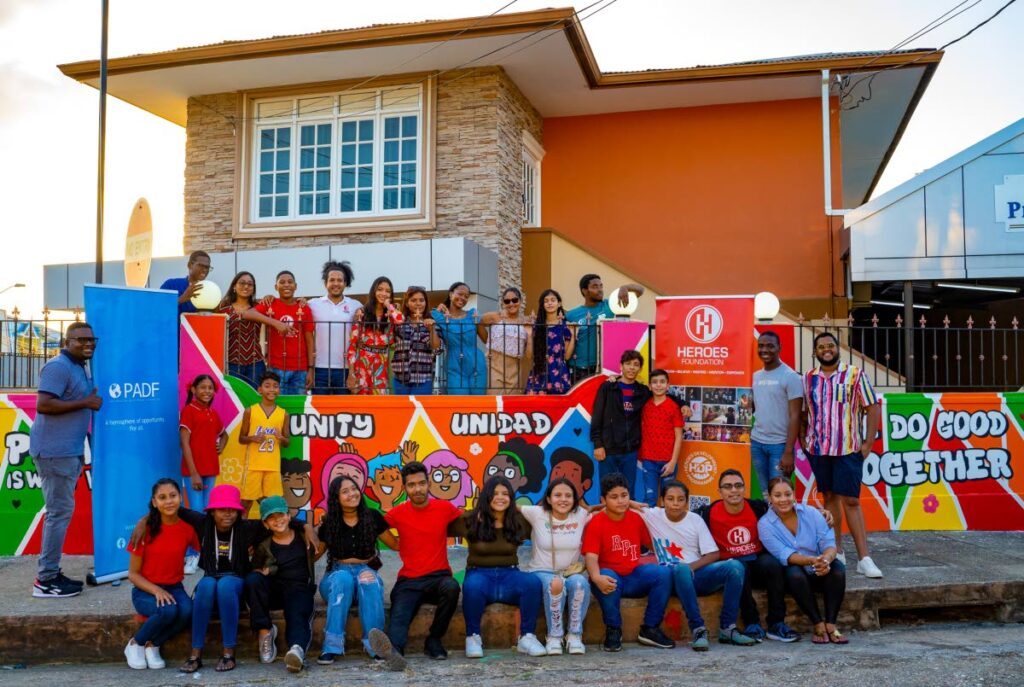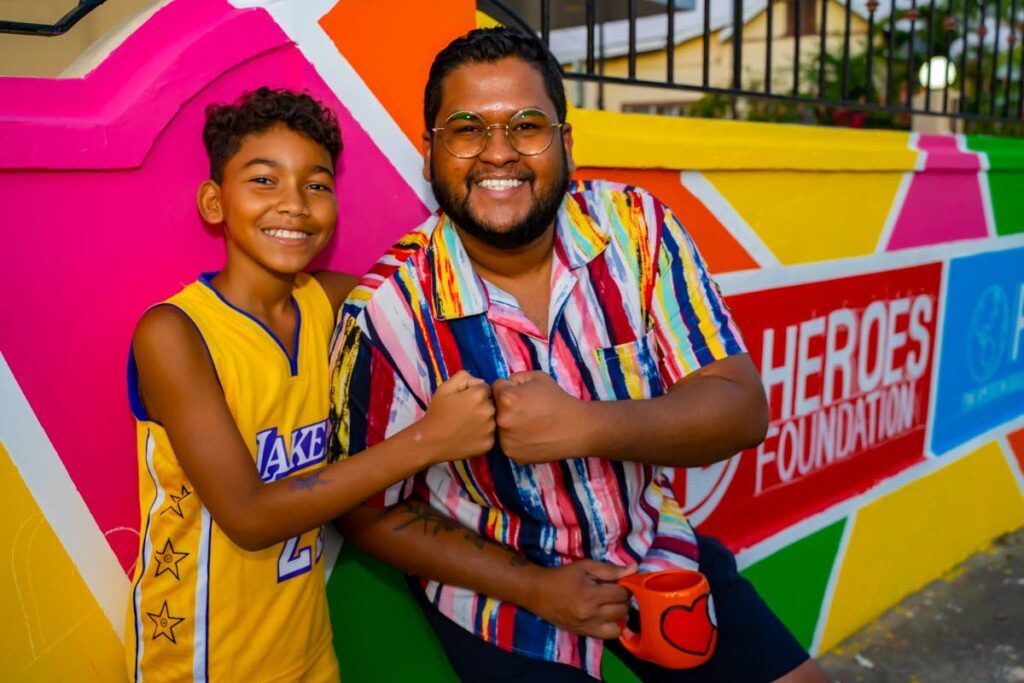Heroes Foundation focuses on child development

The Heroes Foundation aims to transform the lives of the youth involved in its programmes. CEO Lawrence Arjoon said it is one of few local NGOs focused on long-term youth development.
The Heroes Development Programme’s (HDP) revamped three-year curriculum, comprising 12 modules, focuses on psychosocial development, 21st-century skills development, sustainability education, and youth-led project-based learning.
Arjoon told Sunday Newsday the long-term development programme journeys with a child over a minimum of three important developmental years from ages 11-13.
“It's about supporting people to be their best selves and then doing good in their communities and for the environment. These are the critical skills that you need in life like communication and critical thinking, all those skills we know the employers complain about in the workplace right now.

“We also focus on sustainability education, equality and the elimination of violence, energy, climate and environmental sustainability, and then career planning. We’re journeying with these children, helping them become better, and then we’re giving them opportunities to go out and further enhance society and be change makers for positive behaviour change for this country, in their schools, homes and their communities, all grounded in a strengths-based, rights-based, programme with them at the centre.”
He said the Heroes Programme had been in existence for 21 years, and the recently revamped curriculum was aligned with the UN Sustainable Development Goals. He said there were 340 participants in the programme currently, 210 in local secondary schools, and 130 migrant participants online. To date there have been over 7,000 participants, and over 775,000 people reached by youth-led digital campaigns.
There are six operating areas involved in the Heroes Foundation: the Heroes development programme (HDP), the Big Brothers, Big Sisters of Trinidad and Tobago (BBBSTT); the Heroes Connect initiatives; the Heroes Academy; The Heroes Generation-To-Generation Council (G2G), and the Sequential Arts Publications and Digital Campaigns. Arjoon said each entity delivered a different aspect of the Foundation’s goals.
He said it costs $7,000 to support a child through the HDP, while it costs $113,000 annually to house an adult in prison, and US$350,000 whenever there was a murder. He said investing in development was ultimately cheaper for the country than dealing with criminals.
As with most NGOs, funding is a problem. Arjoon said the Foundation combats this in several ways. The first is by partnering with organisations such as Scotia Bank, Republic Bank and Ansa McAl who understand that development is a long-term investment and are willing to invest for the long-term for future benefits and results.
Another way the Foundation funds its activities is through carrying out projects which can partially fund aspects of the programme. Arjoon said the current structured three-year curriculum was developed with the aid of UNICEF.

“We now have that curriculum for three age groups, and we’re currently digitising the five-11 age group, so it’ll be a Caribbean-style Blues Clues, Powerpuff Girls, cartoon coming out in 2024, and of course everyone will have access to it and it can be used as a teaching tool on our platform.”
Funding from the UN’s Spotlight Initiative was incorporated into the programme’s equality and elimination of violence module, which was rolled out to 27 secondary schools and nine groups of migrant children.
Arjoon said the Gender and Child Affairs Ministry is doing a lot of good work. He said the Foundation worked on the development of the draft Safeguarding Framework for TT, coming out of the National Child Policy, and supported the ministry on the investigation of child abuse at community residences.
“I was the only non-State person on that taskforce, and we’re seeing the work coming out of that in the re-organisation of care and protection to enhance the system.
“OPM Gender and Child Affairs actively engages the young people in Heroes in the work that they were doing, so we were part of the kick-off for the developing Women’s Peace and Security framework. They invited the young children in the group to come and be part of that with other CSOs, and are constantly hosting sessions. They have been really taking to heart constant meaningful inclusion in the work that they’ve been doing and we’ve been seeing a lot of changes happening there. We’ve had a very open and collaborative relationship with them, they take the criticisms, critiques, challenges and problems and they ask for solutions and recommendations.”
The foundation also runs a Big Brothers, Big Sisters programme, as Arjoon said mentorship is an important part of child development.
“Mentorship is a commitment to the development of a child, and when we work with children, particularly in community residences, we have very rigorous guidelines for how we connect an adult with that young person. We’re not going to put an adult to mentor a child if they cannot commit to the time requirements. True mentorship is long-term and intensive. You cannot have a sustained impact on a child with one-off interactions. You have to be willing to journey with this child through their challenges, through their development, and support them along a journey, especially children who do not have strong support networks.
“When you create safe spaces for children, they share. Once they are comfortable and they feel safe, they will share, and they will tell us about the challenges they are experiencing and we now look for ways that we can support them."
Arjoon said while there was a spike in school violence when children returned to school after the pandemic, this was greatly reduced in schools where the programme was being run.
“The top feedback we get from children is that adults don’t listen to them. They don’t listen to them when they’re scared, when they’re worried, when they have concerns, when they have ideas, when they have recommendations, and that can become frustrating for a child if everywhere they’re going, they’re not getting an avenue to share, to be heard, to get help.
“We saw after the pandemic, in the schools where we work, we started to listen to the children, created spaces where the children got to engage in extracurricular activities, talked about their feelings, interacted with one another, built positive relationships, and we saw the levels of school violence going down. We need more of that.”
Arjoon said supporting the BBBS programme requires trained, certified staff. He said the coordinators are all social workers who have done the international Big Brothers, Big Sisters training.
He said the children had 24/7 access to psycho-social support from the Foundation and its partners, including the Special Victims Department of the police service or the Children’s Authority when incidents of violence or abuse in families are reported.
Arjoon said the organisation's activities are currently being carried out by nine people, including himself. He said they need to raise an additional $700,000 to be able to keep the programme in at least nine schools, and hire an additional two staff members.
He said the programme is aimed at helping the children work toward a more peaceful and united school environment.
“What we love and are seeing more of is seeing our Heroes participants in schools working with the schools, the teachers, and the administration to create spaces where people can talk and share about the issues their ideas and work towards solutions to the problems. That is transforming our spaces, and meaningful inclusion in safe spaces where people are allowed to share without judgement can transform our society.”
Another important aspect of the programme is the production of media, both for the public, and for the children. Arjoon said the comic books produced by the Foundation were especially well-received.
“The reason we like the comic books is, as someone who used to work at Children’s Authority shared with us, it gives children, particularly those in the community residences something that is theirs. They hold on to it and they cherish it. It’s also something that is relatable, so they can see it, read it, and understand it, they see themselves in the book, because our comic books reflect people from TT. You see yourself in the stories, you see yourself on the pages, and they hold on to it and they take those books with them, the books go with them and they help them in their development.”
He said it was difficult to produce the books, as the Foundation insists on having them designed, drawn, and produced locally.
Arjoon said a mental health and well-being assessment had been done with about 200 children, which found that 95 per cent are at risk of emotional behavioural problems or they are at risk of having challenges managing and understanding their feelings, controlling their internal state, responding to stress, operating under pressure, and navigating change. He said this is why providing psycho-social support was so important.
He said the Foundation believes every single child has value, every single person has a hero within themselves, and people can build safe and sustainable lives and livelihoods if they understand how to leverage the opportunities that are available to them.
“It’s extremely difficult for a child to learn and grow and develop well if they are facing psycho-social issues that have them questioning themselves, their value, their worth and their purpose. That's why we start with self-awareness and then inter-personal relationships.
“We have a terrible culture in this country where we are negative to children and we are negative to one another, and we have to start addressing and changing that. We have to create supportive environments where we encourage people, we identify gaps and we identify challenges in constructive ways.”
He said the Heroes Code, which each child is taught when entering the programme, says Hate Does Not Live Here, and Each One Teach One.
“We don’t encourage any sort of hate in our spaces, because we’re a diverse and multi-cultural country, there’s so much diversity here, it’s been easy, we have a lot of loud examples in the country that showcase that diversity in negative ways, as opposed to the ways that are uniting us.
“We all have a lot to learn from each other, and just as much as we try to help the children learn, they also help us learn. People talk about young people don’t engage with news, or with school, but are we looking at where they are engaging and how they are learning?”
He said the Heroes Connect Initiatives connects the children to opportunities outside their regular environment. He said the Cisco networking academy provides certified technology, skills training for employment. The We Say Yes is providing skills training in photography and videography in a Caribbean context, FilmCo trains the children in film production, IAMovement and Fondes Amandes Community Reforestation Project (FACRP) provide training in reforestation, home gardening, and climate, and Arts-in-Action delivers content around equality and gender-based violence, among many other partnerships.
Arjoon said transportation and food are their biggest costs, and providing logistics to carry out various projects.
“Those things require time, effort, and energy and while we want to connect as many things as possible, it’s difficult, because we have to manage everything else we’re doing. That’s why it’s so important for us to find ways to get operational funding to do the work we’re doing, because I don’t believe that people who are trying to make the country better should be struggling to make the country better, especially when the results and the impact of the work is clearly seen and justifiable.”


Comments
"Heroes Foundation focuses on child development"